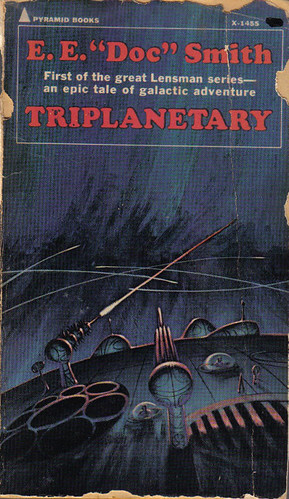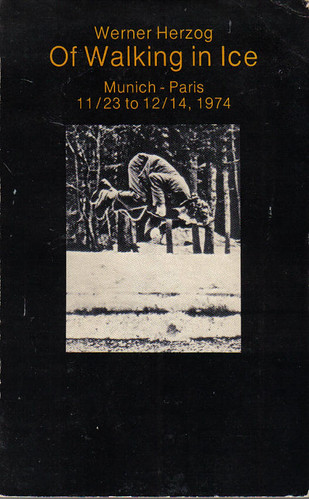
The ninth book in the Oz series,
The Scarecrow of Oz (1915), was also reportedly one of Baum's favorites. Perhaps he liked it so much because he wrote in two characters from his non-Oz books, and let them prance around in Oz for a bit. In the preface we certainly get more of his passive-aggressive "thanks" to all the children that won't let him stop writing Oz books:
I am deeply grateful to my little readers for their continued enthusiasm over the Oz stories, as evinced in the many letters they send me, all of which are lovingly cherished. It takes more and more Oz Books every year to satisfy the demands of old and new readers, and there have been formed many "Oz Reading Societies," where the Oz Books owned by different members are read aloud. All this is very gratifying to me and encourages me to write more Oz stories. When the children have had enough of them, I hope they will let me know, and then I'll try to write something different.Our two new characters are Trot, a young girl, and Cap'n Bill, a boarder at her mother's boarding house and her best friend. Cap'n Bill used to be a ship's captain, but he lost his leg (now he has a wooden one) and spends most of his time now just hanging out with Trot. The two go out on a little boat, but get sucked into a whirlpool and spit out in an underground cave. They are both a bit worried, but each tries to keep their spirits up for the other person's sake. After a day or so, a strange creature (the Ork) washes up in the same cavern.
 The Ork sat upon its haunches much as a cat does, but used the finger-like claws of its front legs almost as cleverly as if they were hands. Perhaps the most curious thing about the creature was its tail, or what ought to have been its tail. This queer arrangement of skin, bones and muscle was shaped like the propellers used on boats and airships, having fan-like surfaces and being pivoted to its body.
The Ork sat upon its haunches much as a cat does, but used the finger-like claws of its front legs almost as cleverly as if they were hands. Perhaps the most curious thing about the creature was its tail, or what ought to have been its tail. This queer arrangement of skin, bones and muscle was shaped like the propellers used on boats and airships, having fan-like surfaces and being pivoted to its body.The Ork and our two heroes eventually escape the cave, having a few adventures on the way, and after a series of stops (on an island where the only inhabitant is a real jerk, and in the Land of Mo where it rains lemonade and snows popcorn), they fly over the deadly desert and land in Jinxland, an isolated corner of the Land of Oz that is separated from the rest of the country by a range of mountains and a big gulf.
Oh, and on their way they run into Button Bright, who we previously saw in
The Road to Oz.
Jinxland is a lovely place, but it is under the thumb of an evil king (King Krewl), and no one there even knows about the lovely Ozma back in the Emerald City. The king is trying to marry his niece, Gloria, off to the rich but awful Googly-Goo. She, on the other hand, is in love with Pon, the gardener's assistant. But actually, Pon is the son of the previous king (King Phearse), who was overturned by King Krewl. And Gloria is the daughter of King Kynd, the king who was killed by Pon's father. Got it? Basically, Gloria is the true ruler of Jinxland, and Pon is royalty.
Because Gloria won't submit to her rich suitor, the King pays a wicked witch to freeze her heart and get her to stop loving Pon. That works, but she doesn't love or care about anything else either and still won't marry Googly-Goo. The wicked witch also turns Cap'n Bill into a grasshopper with a wooden leg, which makes everyone sad.
Luckily Glinda the Good has been reading about all this in her magic book, so she sends the Scarecrow to help out. Eventually the Scarecrow, with the fortuitous return of the Ork and his fellow Orks, is able to get rid of King Krewl, put Gloria on the throne, turn everyone back to normal, and get the whole gang over the mountains and into Oz and back to the Emerald City for a celebration (a rather familiar ending for the Oz books).
[And, as always, you can
read the full text here. This site is even more awesome, though, as the creator has scanned in the illustrations from the book and embedded them with the text. Very fun.]
 I donated blood today, and if you live in Austin (or anywhere really) you should too, as they are mega-low on the blood donations this summer [unless of course you are scared to death of needles like Dr. M]. Not only will you have the fun of answering a series of semi-embarrassing questions (they aren't so bad, although I don't often get asked if I've ever accepted money for sex or had sex with an African), but you will also get tasty Nutter-butters, or the cookie or snack of your choice afterward.
I donated blood today, and if you live in Austin (or anywhere really) you should too, as they are mega-low on the blood donations this summer [unless of course you are scared to death of needles like Dr. M]. Not only will you have the fun of answering a series of semi-embarrassing questions (they aren't so bad, although I don't often get asked if I've ever accepted money for sex or had sex with an African), but you will also get tasty Nutter-butters, or the cookie or snack of your choice afterward.









